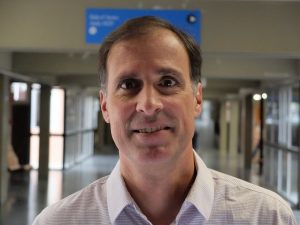 The Master in Business Research alumni and currently PhD student at the UB Business School, Carlos Politi, grew up in Argentina. There, he earned a law degree and worked for the Government and then in the private sector. Politi soon realized that his true passion was human resources, so he re-directed his career in that direction.
The Master in Business Research alumni and currently PhD student at the UB Business School, Carlos Politi, grew up in Argentina. There, he earned a law degree and worked for the Government and then in the private sector. Politi soon realized that his true passion was human resources, so he re-directed his career in that direction.
After several years of working in human resources, he quit his job and moved to the United States to undertake masters’ studies in Human Resources at Cornell University. That was a life changing decision for Mr Politi: he has held different roles at Fortune 500 companies. Currently, he is working at Gates Corporation in Denver after his masters’ degree at the Business School.
You had been working for years when you decided to start the Master in Business Research. Why did you take this decision?
I think it had to do with my need to learn new things and with curiosity. My career has been a combination of professional practice and active learning. It is a feedback loop: on the one hand, going to school has prepared me to analyze complex business problems. On the other hand, professional experience allows me to frame research questions for my academic studies.
In previous roles that I held, I worked in people analytics and organizational development. I realized that I needed to dive deep to learn more about advanced quantitative and qualitative techniques. The Master in Business Research offered a reasonable balance to learn data science methods while incorporating other core business subjects such as finance, operations and marketing.
Did obtaining the master’s degree help you to get your current job?
Certainly. Completing this master’s degree opened the door for new opportunities. Gates Corporation offered me the chance to develop the full stack of predictive analytics solutions, from enabling a reporting suite for human resources to working in people analytics, which requires applying statistics or other research methods. I can do those things because of the unique set of skills that I developed in this master.
Tell us more about your current employment at Gates Corporation.
My job drives me to think holistically about human capital. I see many companies that look at people analytics very narrowly, defining it from a quantum and coding perspective. Doing predictive analytics in human resources is much more than writing a line of code in R or SQL or using machine learning algorithms. The human resources field is imperfect by nature, so you need to balance qualitative and quantitative techniques. I am glad that the Business School fostered that critical thinking in all the classes that I completed.
Nowadays, you are a PhD student at the Business School. What led you to make this decision?
I felt it was the obvious choice after I completed the master’s program. My thesis explored why employees leave organizations, and given the time constraint, it was limited in terms of what more could be researched on that topic. The doctorate program allows me to thoroughly study that phenomena, adding layers of complexity, such as looking at the effects of social networks, conflict, and trust in an organization, particularly their impact on turnover decisions.
I am fortunate that my thesis directors, Patrica Elgoibar and Elio Shijaku, are experts in human resources and network theory. Their guidance and advice are already helping me catalog and link apparently unrelated concepts and theories that impact employee commitment and turnover.
How do you feel about being a PhD student?
I think that, beyond the prospect of doing exciting business research, the PhD program prepares you to deal with the unknown and to question concepts or ideas that could be seemingly accepted but could not be right.
It comes to my mind, one of Ray Dalio’s Principles. The ability to deal well with ‘not knowing’ is more important than what you know. Basically, how do you know that you are right? Researching at PhD level is filled with that question. And it is the struggle with that notion that opens your mind to see things from different angles.
Do you think that this pandemic period it is a great moment to learn?
I think the need to learn and research never stops. When it comes to university degrees, there is a large body of empirical studies that show that demand for education is positively related to higher future earnings.
Would you recommend other colleagues to take a postgraduate course at the UB?
Absolutely. My experience throughout the masters and now in the PhD program has been outstanding. The faculty’s academic level at the Business School is very high, comparable, I think, to top schools in the United States.